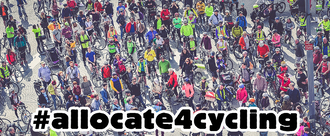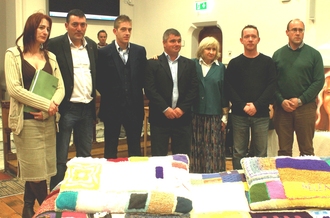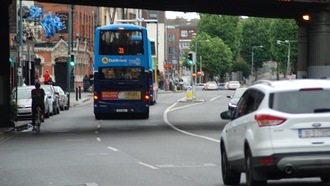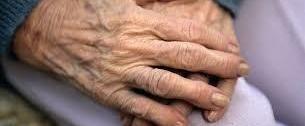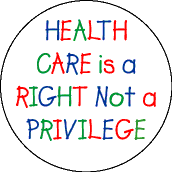- Featured
- Animal Rights
- Anti-racism
- Arts & Culture
- Children
- Climate
- Corporate accountability
- Crime
- Disability rights
- Economic
- Education
- Environment
- Food and Sustainable Production
- Gender Equality
- Governance and Transparency
- Health
- Housing
- LGBT Rights
- Mental health
- Northern Ireland
- Planning
- Privacy and Data Protection
- Rural Inequality
- Social Justice
- Trade
- Transport and Infrastructure
- Workers' Rights
- More
-
Allocate 10% of the National Transport Budget to CyclingCycling offers a wide range of benefits to our society including reducing carbon emissions, relieving congestion, improving health and making our towns safer, more pleasant places to live and move about. Unfortunately, the resources allocated to cycling at present are nowhere near sufficient to make it a safe and normal activity for people of all ages and abilities. Therefore, we are calling on Minister Ross to: 1.) Allocate at least 10% of the Transport Budget to cycling. 2.) Implement the National Cycle Policy Framework in full. 3.) Take action to reduce transport emissions so that Ireland fulfils its obligations under the Paris Agreement on Climate Change.680 of 800 SignaturesCreated by Cyclist .ie

-
Tell Supermarkets to create plastic-free aisle in every storeAround 300 million tons of plastic are produced globally each year, yet just 12 per cent is recyclable [1]. There are natural biodegradable alternatives to plastics available today so their ever increasing use can no longer be justified. The Feb. 2016 'New Plastics Economy: Rethinking the future of plastics' report analysis indicates (i) that 95% of the value of plastic packaging material, worth $80-120 billion annually, is lost to the economy, and (ii) that, on the current track, there could be more plastics than fish in the ocean (by weight) by 2050. The most important voice of reason that a supermarket can hear is that of the customer. By signing this petition you are helping to get the message across to key decision makers in the grocery sector that you no longer want to be part of the planetary plastic problem. That you want alternatives so this massive problem can finally start to be addressed, so future generations have a cleaner world to live in free from the dangers that a plastic filled ocean represents. There is a large demand for plastic free options so retailers should benefit if facilitating this for customers. Retailers who take a lead on this should see increased brand value, positive word of mouth and greater customer loyalty. The need for innovation in this area will spur job creation and new inventions that will be good for the economy too. It is clear to see now that proper disposal of plastic is a burden on all parties involved, particularly for the natural environment that is already starting to break under the burden. The situation with plastics has gotten way out of hand and it is up to all parties involved to act now. [1] http://www.telegraph.co.uk/science/2017/02/10/supermarkets-urged-create-plastic-free-aisle-every-store/4,245 of 5,000 SignaturesCreated by Dylan Regan

-
Save our GP's (Northern Ireland)GP's are an essential service within all communities accross Northern Ireland but this is under threat. GP's services have had and are having many GP's resigning and retiring yet we do not have enough people in training to replace those doctors. This is exasperated by underfunding of NHS creating a situation of too few beds then which ultimately puts far more pressure on GP's as people's only other source of ongoing treatment in the community.5 of 100 SignaturesCreated by Matt Beeching
-
Support Teac TomWe are looking for government funding to keep this vital. immediate counselling and support service. We support children and adults that have lost someone to suicide or those that struggle with mental health issues2,041 of 3,000 SignaturesCreated by Angela O Connor
-
Pass Automatic Inquests for every maternal death in Ireland as a matter of urgencyThere are a number of reasons to get this through without wasting time: - UCC reported for the period between 2011 and 2013, a total of 27 maternal deaths.Of all these deaths, there were inquests for only three. - It matters very deeply to the families who have already lost a loved one. Some had to fight for 4 years to have an inquest; and they are still fighting this campaign to have the law changed. - It will help other families who in the future may find themselves in this dreadful situation; they would not have this added suffering at a time of intense grief. - It will save women's lives because if reasons are found for a death then changes can be made to prevent the same mistake being made again. We need everyone to sign this petition to the Minister for Justice demanding a guarantee that this legislation will get over the line as quickly as possible to help give all of us greater accountability from our maternity services396 of 400 SignaturesCreated by Doreen Fitzmaurice
-
Clontarf to City Centre Cycle Route needs to be fully segregatedIn planning since 2012, the Clontarf to City Centre Cycle Route was supposed to provide a fully segregated two-way cycle path between the existing coastal path at Clontarf and the city centre, via Fairview and North Strand. But instead the council has opted for a non-continuous cycle route which mixes cycling with buses, heavy traffic and pedestrians. The solution is to return to a design with a continuous two-way cycle path on the east side of the road along the route. This is the safest, most space efficient, and most attractive option for most people who cycle now and those who will cycle when conditions are improved. Here's the reasoning for a two-way cycle path: (1) Cycling for all ages and abilities Mixing cycling with buses and other motorists on a busy route does not fit with the idea of cycling for “all ages and abilities”: The route must be fully segregated. The City Development Plan states: “With regard to the city centre, in particular, ease of access to persons of all ages and abilities is a significant indicator as to how inclusive Dublin is as a city,” and the National Cycle Policy states: “The bicycle will be the transport mode of choice for all ages” -- we need to stop these from becoming hollow words. (2) Arguments against it don’t make sense The council and their consultants have outlined a number of “issues” as to why the two-way path should not be chosen -- from safety of “cyclists taking chances” crossing away from official crossings to the idea that commuters won’t use the route. These, however, don’t make sense. Similar routes recently built in London prove that the “issues” can be fixed by good design. The council’s arguments on safety are nonsensical -- they rate having a two-way cycle path across the entrances to low-volume side streets as more dangerous than their plan of mixing cyclists with buses at bus stops and with trucks and heavy traffic turning from one major road to another. (3) Connection to the S2S North Even if other connections can be made between the Docklands and the coastal section S2S Dublin Bay route on the northside, the Clontarf to City Centre Cycle Route will be the most direct link between the coastal route and the city centre. It is of the utmost importance that a segregated route is provided to allow people to cycle from the costal section to the city centre and vice versa. (4) Connection to the Liffey Cycle Route and southside The council’s plan is to end the Clontarf to City Centre Cycle Route outside Connolly Station -- this means people cycling to/from the southside and planned Liffey Cycle Route will have to brave the many lanes of traffic around the Customs House and Busáras. A fully segregated two-way path could easily be extended between Connolly Station and the quays, allowing for a safe and attractive connection. Please sign and share A two-way cycle path is the option which will get the best outcomes for safety, transport, health, climate change, and tourism -- please sign and share.1,582 of 2,000 SignaturesCreated by Cian Ginty

-
Ban Fracking in IrelandThe Oireachtas is asking you for your thoughts on fracking and unconventional extraction of fossil fuels. In October, they unanimously agreed to the principle of introducing legislation that would ban all fracking activities in Ireland. Now they want to know what the public thinks on the matter. There are lots of reasons why fracking is bad news. And mounting global and national peer reviewed and scientific evidence that taking oil and gas out of the ground poses a significant threat to Climate Change, Public Health, Water Quality, and the Natural Environment. The proposed bill would make it illegal to take oil and gas out of the ground from areas in Ireland where it would need to be fracked, such as the shale deposits across Sligo, Leitrim, Roscommon, Donegal, Cavan, Monaghan, Clare, Limerick, Cork and Kerry. Please help us demonstrate that the people of Ireland support a legal ban on fracking activities by signing this petition.3,392 of 4,000 SignaturesCreated by Kate Ruddock
-
Fair Deal Scheme To Be allowed for Home CareThis is very important to my family and I. My mum has Alzheimer's and her condition is progressing fast. My mum would like to stay in her home for as long as she can. I want the scheme to be allowed for Home Care. Most people want to stay in their own homes. Like the saying home is were the heart is. We need to allow the elderly their dignity and if they want to stay at home they should be allowed to.17,213 of 20,000 SignaturesCreated by Helen Barrett
-
Implement the evacuation plan for AleppoCivilians must be evacuated and afforded safe passage out of Aleppo. Our leaders must ensure the UN plan for evacuation is implemented.51 of 100 SignaturesCreated by Clodagh King
-
Reinstate Shannondoc Services to Co.ClareThe WHO Constitution enshrines “…the highest attainable standard of health as a fundamental right of every human being.” And the right to health includes access to timely, acceptable and affordable health care of appropriate quality - yet here in County Clare our Health Services have been struck another blow with the decision by Shannondoc to scale back on the services they provide to Kilrush, Ennistymon & Killaloe - all three areas being geographically challenged in their own right. - how does the distance from Kilrush to Miltown Malbay (28km) on a bad road, Miltown to Limerick (68km) on an even worse road or the person who fall ill that lives in Kilbaha - which is 51km to Miltown or those in Ballyvaughan who have to travel 43km to Miltown - get them the highest attainable standard of Health that is their fundamental human right? We are all aware of the importance of the Golden Hour and unless these people break the speed limits there is no way on earth that the journey will be made within that Golden Hour - thereby the distance they are now required to travel has now increased thereby creating a higher risk to the patients health and well being The announcement from Shannon Doc refers to Ennis and Nenagh Hospitals - both hospitals which on the recommendation of the HIQA report just over seven years ago - were downgraded to make way for a so called ‘Centre of Excellence’ in Limerick University Hospital - and the 24hr A&E service was downgraded to a 12hr A&E service 8am-8pm - so these patients of the out of hour Shannon Doc will more than likely be referred to Limerick if needs be hence the importance of the Rapid Response Vehicles which we are also informed are under review in both Clare and Tipperary. We are now looking for what is our fundamental right per the World Health Organization - We in Clare demand that all services be restored to Kilrush, Ennistymon and Killaloe forthwith and that the re-opening of a 24hr A&E in Ennis General Hospital be put on the agenda and followed up. In this the 21st Century - every county in the country should have on its doorstep ‘a fully manned general hospital and accident and emergency department’ We are not asking for the services to be restored for just the people of Clare but for every man, woman and child who may and do visit the area throughout the year and especially during holiday times - that may have the misfortune to fall ill - that they can be rest assured that there are adequate health services in the area or not that far away - NOT in the next County. Our health is our wealth - to play Russian roulette with our health is not acceptable. We believe that solutions are available and achievable with the co-operation of both GP's, Shannondoc, HSE, The Health Minister and the Department of Health, and the public themselves - all working and consulting together to find a solution.212 of 300 SignaturesCreated by Deirdre Culligan
-
Justice for Refugees in IrelandI care about it as they dont have a life. They are cramped up in hotel rooms and being ripped off and not given a chance to life like a human. Give back to society to work and make a better life for themselves. Please dont turn a blind eye. Employ more people in this area to process applications quickly. You are destroying people's choices.18 of 100 SignaturesCreated by Noreen Doherty
-
Stop the alcohol industry killing the Public Health Alcohol BillEvery one of us knows someone who has been affected by alcohol abuse. 85% of people think we drink too much and this needs to change. The new Alcohol Public Health bill is based on international research and is a package of changes proven to work. But it is under threat because the alcohol industry is lobbying our politicians to change it using a wide range of tactics. They even had to be told to stop harassing Senators on their way into the Seanad. Politicians say they have never seen anything like it. The Alcohol Industry are right in one respect. The new bill will not solve Ireland's alcohol abuse problem. It is however a vital first step in changing our culture so that children as young as 8 years are not brainwashed into thinking being Irish means drinking. Like a motor car which can't run properly if it loses a wheel, removing or changing sections of the bill means 3 people will continue to die each day from alcohol abuse. The alcohol industry is using Trump like tactics of fear and misinformation to get TDs and Senators to accept amendments. Examples include Alcohol Industry "Drink prices will increase" Fact: At the current proposed minimum unit price, drink prices will only increase if retailers are selling below cost or really cheap strong alcohol. Alcohol Industry “The Bill will damage our economy." Fact: we taxpayers subsidise alcohol industry profits by €1 billion euro each year (even after excise duties etc.) due to costs of alcohol harm. Reducing alcohol consumption to lower levels will benefit the economy. Alcohol Industry: It will cost retailers too much to segregate alcohol products as they have to build walls. Fact: Retailers can choose how they will separate alcohol products once they restrict display of alcohol products. Alcohol Industry "Voluntary advertising codes work" As the Conor Mc Gregor Budweiser campaign showed voluntary codes do not prevent children being targeted. Advertising will still be allowed under the new bill. Real change happens when everyday people like you and I come together and stand up for what we believe in. Together we can reach lots of people and help create change around this important issue. After you've signed the petition, could you also take a moment to share it with others? It's really easy – all you need to do is share below. Thank you!2,533 of 3,000 SignaturesCreated by Life Wise


